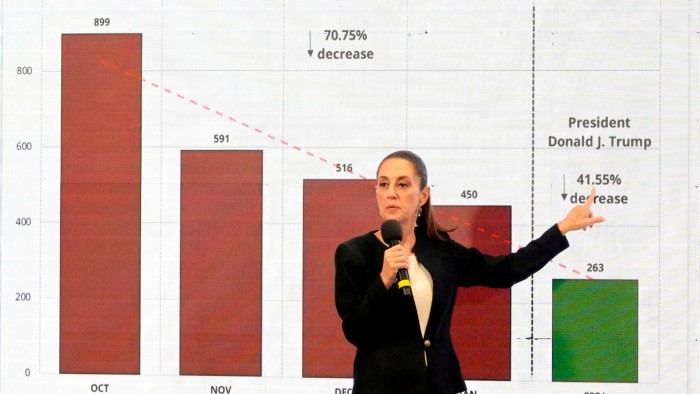After months of US threats to hobble Mexico with tariffs over its “intolerable alliance” with drug cartels, the Trump administration has become positive about its southern neighbour.
President Donald Trump has thanked President Claudia Sheinbaum, whom he has called “a wonderful woman”, for working hard to stop fentanyl smuggling to the US. Homeland security secretary Kristi Noem said she is “remarkable”. One of Mexico’s biggest critics in Congress said the Mexicans were “willing partners” on security for the first time in years.
Trump sought to force Mexico into action by designating several drug cartels as “terrorist organisations” and imposing a 25 per cent tariff on some exports. But Sheinbaum, sworn in weeks before Trump’s November election victory, used her head start to begin quietly overturning Mexico’s security strategy even before he took office.
Without a word of criticism for her mentor and predecessor Andrés Manuel López Obrador, she has abandoned his “hugs not bullets” platform and reversed his policy of minimal co-operation with the US. Instead, Sheinbaum moved to revive the police and tackle drug cartels more directly.
The stakes could not be higher. About 200,000 Mexicans were murdered during López Obrador’s six-year term and 50,000 disappeared, both a steep increase from the previous president. Meanwhile, hundreds of thousands of Americans have died from overdoses of lethal drug fentanyl — most of it trafficked via Mexico.
In her first 100 days, Sheinbaum seized over 100 times more arms than López Obrador did in the same period and 2,000 times more drugs, according to one estimate. After six months, she appeared to have detained more alleged organised crime members than he did in his entire presidency.
“It has played out as a very different security strategy, it’s much more confrontational,” said Lila Abed, director of the Mexico Institute at the Washington-based Wilson Center. “The Mexican government has had to respond very quickly to the demands from the White House.”
Sheinbaum showed she was serious about working with Trump just weeks into his term, sending over the largest group of wanted drug traffickers Mexico had ever delivered to the US. She bypassed normal extradition rules to give up the 29 alleged narcos, who included a drug lord Washington had wanted for four decades.
The countries’ security heads have visited each other’s capitals and the US has stepped up surveillance drone flights over Mexico, US media has reported. Mexican authorities say American intelligence has led to recent cartel arrests.

The reboot has been led by Sheinbaum’s security chief — who embodies more than anyone the shift in Mexican policy.
Where López Obrador militarised law enforcement and sidelined police, Sheinbaum has put her weight behind Omar García Harfuch, an ex-cop who survived a cartel assassination attempt. She pushed through legislation to beef up his investigative powers and he is recruiting an elite federal police force — to replace the one dismantled by López Obrador.
“Its an enormous contrast in terms of expertise,” said Eduardo Guerrero, a Mexican security analyst. “We went from amateurism to a professional in security.”
There are early signs the new approach may be paying off. Homicides, which were already trending downward when Sheinbaum took office, fell nearly 15 per cent in her first six months and several other crimes dropped.
But disappearances remain near record highs and violence still ravages huge swaths of Mexico. In places like Sinaloa, where two cartels are waging a gruesome war against each other, corpses are regularly found around the capital city and parents are afraid to send children to school.

Some analysts question whether focusing on US priorities detracts from Mexico’s own issues. And while polls show Mexicans overwhelmingly support Sheinbaum, they still say insecurity is the country’s top problem.
“The reality is that a number of conflict sites across the country need urgent attention in order to keep them from spinning further out of control,” said Falko Ernst, a security expert in Mexico City.
The government argues its interventions are starting to bear fruit in hotspots like Guanajuato, Mexico’s top auto-producing state and by far its most murderous. Sheinbaum says arrests of particularly violent criminals there are behind very early signs of a drop in killings.

But security experts say the government will not take back real control without serious resources and corruption reforms that go beyond a focus on arrest numbers and drug seizures.
They have focused on “satisfying US demands” by “playing the PR game: keeping the worst of the ongoing fighting out of the media, downplaying the scope of human costs, and delivering heads and labs to the White House,” said Ernst. “Whether this amounts to a true strategy shift can be questioned.”
Sheinbaum, however, is grappling with the biggest fiscal deficit since the 1980s and made a double digit cut to the security budget. That means García Harfuch must try to run operations with the help of the historically hermetic military or with cash-strapped — and often corrupt — local governments.

For now, those efforts seem to be keeping Trump’s most aggressive instincts at bay.
But while Sheinbaum has mostly escaped criticism for skirting extradition rules, there is one US threat some Mexicans and her leftwing nationalist government would struggle to abide: Drone strikes on cartels inside Mexico. Although the US has said nothing on the matter publicly, reports by NBC and others say the White House is seriously considering them.
“The US is pleased or at least has congratulated Mexico for its recent security results,” Abed said. “Whether that’s going to suffice, and that’s going to just let Trump ease its more aggressive policies on Mexico? I question that.”
Source link









